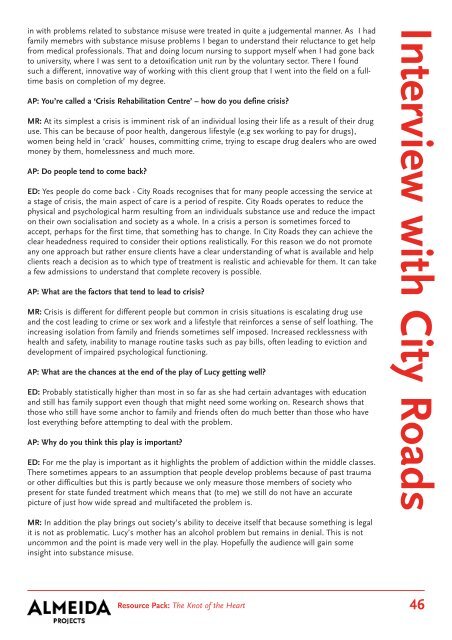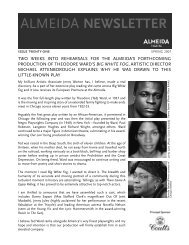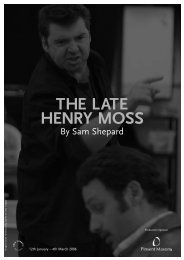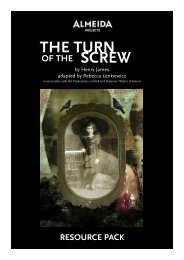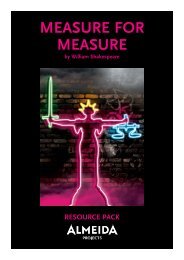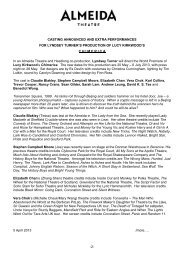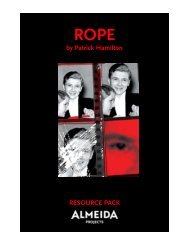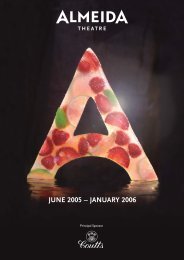KNOT HEART - Almeida Theatre
KNOT HEART - Almeida Theatre
KNOT HEART - Almeida Theatre
- No tags were found...
You also want an ePaper? Increase the reach of your titles
YUMPU automatically turns print PDFs into web optimized ePapers that Google loves.
in with problems related to substance misuse were treated in quite a judgemental manner. As I hadfamily memebrs with substance misuse problems I began to understand their reluctance to get helpfrom medical professionals. That and doing locum nursing to support myself when I had gone backto university, where I was sent to a detoxification unit run by the voluntary sector. There I foundsuch a different, innovative way of working with this client group that I went into the field on a fulltimebasis on completion of my degree.AP: You’re called a ‘Crisis Rehabilitation Centre’ – how do you define crisis?MR: At its simplest a crisis is imminent risk of an individual losing their life as a result of their druguse. This can be because of poor health, dangerous lifestyle (e.g sex working to pay for drugs),women being held in ‘crack’ houses, committing crime, trying to escape drug dealers who are owedmoney by them, homelessness and much more.AP: Do people tend to come back?ED: Yes people do come back - City Roads recognises that for many people accessing the service ata stage of crisis, the main aspect of care is a period of respite. City Roads operates to reduce thephysical and psychological harm resulting from an individuals substance use and reduce the impacton their own socialisation and society as a whole. In a crisis a person is sometimes forced toaccept, perhaps for the first time, that something has to change. In City Roads they can achieve theclear headedness required to consider their options realistically. For this reason we do not promoteany one approach but rather ensure clients have a clear understanding of what is available and helpclients reach a decision as to which type of treatment is realistic and achievable for them. It can takea few admissions to understand that complete recovery is possible.AP: What are the factors that tend to lead to crisis?MR: Crisis is different for different people but common in crisis situations is escalating drug useand the cost leading to crime or sex work and a lifestyle that reinforces a sense of self loathing. Theincreasing isolation from family and friends sometimes self imposed. Increased recklessness withhealth and safety, inability to manage routine tasks such as pay bills, often leading to eviction anddevelopment of impaired psychological functioning.AP: What are the chances at the end of the play of Lucy getting well?ED: Probably statistically higher than most in so far as she had certain advantages with educationand still has family support even though that might need some working on. Research shows thatthose who still have some anchor to family and friends often do much better than those who havelost everything before attempting to deal with the problem.AP: Why do you think this play is important?ED: For me the play is important as it highlights the problem of addiction within the middle classes.There sometimes appears to an assumption that people develop problems because of past traumaor other difficulties but this is partly because we only measure those members of society whopresent for state funded treatment which means that (to me) we still do not have an accuratepicture of just how wide spread and multifaceted the problem is.Interview with City RoadsMR: In addition the play brings out society’s ability to deceive itself that because something is legalit is not as problematic. Lucy’s mother has an alcohol problem but remains in denial. This is notuncommon and the point is made very well in the play. Hopefully the audience will gain someinsight into substance misuse.Resource Pack: The Knot of the Heart 46


